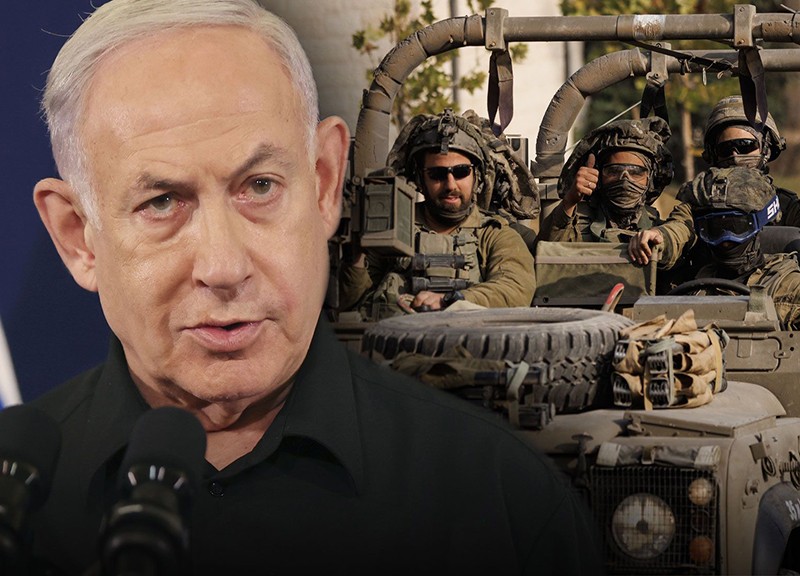
The Gaza war makes it more difficult but also reminds officials of the horrifying alternative.
By Karen Elliott House, Riyadh, Saudi Arabia - WSJ
When Franklin D.Roosevelt and King Abdul Aziz met to establish U.S.-Saudi relations in 1945, the king never shared with anyone the memorandum of their conversations, believing that his friendship with FDR depended on goodwill and good faith, not a scrap of paper.
Now his grandson Crown Prince Mohammed bin Salman is the kingdom’s de facto leader, and he is actively trying to revive Saudi-U.S. friendship by doing the opposite. The crown prince seeks a formal Senate ratified treaty codifying a new set of mutual commitments between Riyadh and Washington.
The translator for Abdul Aziz’s meeting with FDR later revealed that the king had given the president his advice about European Jewish survivors of the Nazi genocide: “Give them the choicest lands and homes of the Germans who oppressed them.” Instead, in 1948 FDR’s successor recognized the new Jewish state in Palestine. Saudi Arabia never did.
That would change under the prospective new U.S.-Saudi agreement, which would include Israel as a third party. The war in Gaza complicates matters, but the U.S., Israel and Saudi Arabia are still talking in an effort to create a new, economically integrated Mideast by bringing the dynamic Arab state into overt peaceful relations with Israel. In exchange, the U.S. would sign new trade, security and nuclear-enrichment deals with Riyadh, which would make some pledges of its own, possibly involving oil.
That the three parties continue to hold out hope is a sign of how much both Saudi Arabia and Israel believe their cooperation could transform the region. It was never going to be easy. At any time, groups like Hamas, Hezbollah and Palestinian Islamic Jihad have the capability to cause chaos, as Hamas did with its Oct. 7 attack against Israel.
Yet the optimism now for an Israeli-Saudi peace is rooted in the hopelessness of the current Mideast. Israel’s military might and strong U.S. support proved insufficient to guarantee the Jewish state’s security. Iran and Hamas are exploiting the Palestinian issue to undermine public support for Israel across the region, and even in the U.S., where university campuses have hosted violent anti-Israel demonstrations. Perhaps, this thinking goes, the horrors of today’s Mideast will motivate all parties to take previously unthinkable steps to resolve the Palestinian issue and secure widespread Arab cooperation in building a more integrated and prosperous region.
There is a narrow line between motivation and wishful thinking, and the Saudis are anxious for an early end to hostilities. Officials are telling the Biden administration and a visiting delegation of 10 U.S. senators to persuade Israel not to invade Gaza or do anything that will prolong or widen the war. A short look at the horrors of war could create new determination to take risks for peace, but prolonged exposure to death and destruction could also breed a new generation of angry Arabs who block Saudi-Israeli rapprochement. Today’s young Saudis, a majority of whom are under 30, have never seen war as their parents and grandparents did in 1967 or 1973. But if this current war drags on, with television and social media emphasizing Palestinian casualties in Gaza, young Saudis could be aroused against Israel.
To keep hope alive, Crown Prince Mohammed is doing all he can to maintain business as usual in Saudi Arabia. When Hamas’s false claim that Israel bombed a Gaza hospital led to massive street demonstrations across the Mideast, Europe and U.S. college campuses, Saudi Arabia remained quiet. To be sure, demonstrations are risky in an authoritarian state. But a visitor here sees no signs that Saudi citizens are exercised over events in Gaza. The crown prince has set out the parameters for his citizens by condemning the targeting of civilians, calling for creation of a Palestinian state, and ignoring Hamas to support the rival Palestinian Authority.
Last week the crown prince hosted the president of South Korea, and both attended the Future Investment Initiative, an annual threeday confab that draws Wall Street titans and thousands of international visitors. “The Phantom of the Opera” opened in Riyadh, and the city is hosting golf’s Ladies European Tour and a world heavyweight boxing match. At the same time, Yemen’s Iran-backed Houthi militia fired drones and missiles across the kingdom toward Israel. But a U.S. Navy destroyer in the Red Sea intercepted them all—a vivid reminder of the importance of U.S. military might in the Middle East.
Foreign-policy observers here believe—or at least hope—that Iran wants to avoid direct involvement in this war because any attack by Iran on Israel surely would prompt retaliation from Israel and could draw the U.S. into hostilities. For its part, Saudi Arabia is doing everything possible since restoring diplomatic relations with Iran this summer to avoid inflaming Tehran. Still, it’s hard to imagine Iran would simply accept a new U.S.-Saudi-Israeli pact to cooperate in the Mideast at Iranian expense.
With war clouds covering much of the region, one thing is clear. Saudi Arabia, having flirted with China and Russia, recognizes that the U.S. is its best—its only—security option. Whether that will lead it to recognize the Jewish state in the current environment is unclear. But if lawmakers put aside their negative perceptions of Saudi Arabia to ratify a deal, it will be because Israel throws its support behind Riyadh.
Ms. House, a former publisher of The Wall Street Journal, is author of “On Saudi Arabia: Its People, Past, Religion, Fault Lines—and Future.”














